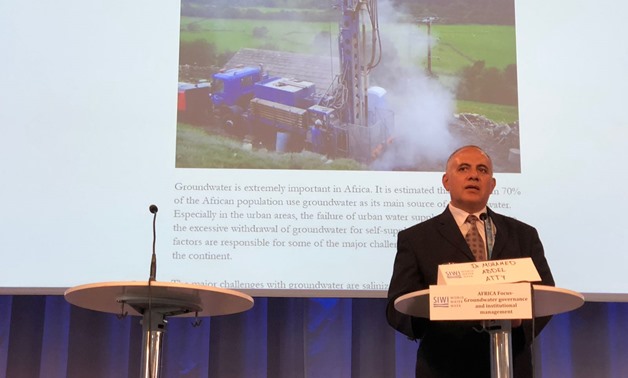
Minister of Water Resources and Irrigation gives a speech at the 2018 World Water Week in Stockholm- Press photo
CAIRO - 29 August 2018: A total of 200,000 Egyptian farmers will lose their source of livelihood if the rate of renewable water decreases by 2 percent, said Egyptian Minister of Water Resources and Irrigation Mohamed Abdel Ati in a speech at the 2018 World Water Week in Stockholm on Tuesday.
“More than 95 percent of Egypt’s territories is desert; it [Egypt] is one of the world’s driest countries. Its 100-million population lives along the two banks of the Nile and the Delta,” said the minister.
According to data shown at the ceremony of the 62nd anniversary of Farmers’ Day in 2014, about 51 millions of Egyptians are farmers cultivating 10 million feddans (one feddan equals about 1.038 acres) in 2015. Most of arable lands located in the Delta are vulnerable to drowning risks due to climate change impacts; it has been estimated that approximately 5 million people could be displaced if sea level increased due to climate change.
In the period between 1910 and 2010, Egypt’s sea level rose by a total of 11.3 centimeters, increasing by an average of 0.113 centimeters annually. In the past seven years; however, increases have slowed down, rising by 0.3 to 0.5 centimeters in most areas, with an average of 0.04 to 0.07 centimeters annually, compared to the former rate of 0.113, head of the Egyptian Meteorology Authority (EMA) Abdel-Aal has told Egypt Today previously.
In his speech, the minister added that the government is trying to fill the gap between water resources and consumption through working on several mitigation projects that aim at recycling and treating 25 percent of consumed water.
Egypt suffers from a water deficit of 21 billion cubic meters annually and imports a total of 34 billion cubic meters of water annually in food products to achieve food security. Egypt’s consumption reached 110 billion cubic meters, while it currently has 60 million cubic meters annually, Abdel Ati said in previous statements.
“Egypt is working on providing a strong infrastructure to address these risks,” Abdel Ati said in his speech at Stockholm, adding that most areas of North and South Africa will be threatened by water scarcity in accordance with the climate-related studies. The minister also noted that the government is working with African countries, particularly the Nile Basin countries to cooperate to adapt with climate change.

Comments
Leave a Comment